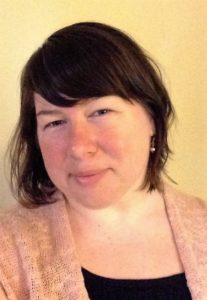 Shannon Schaefer is a Master of Divinity candidate at Duke Divinity School and a member of Chapel Hill Mennonite Fellowship in Chapel Hill, North Carolina. Her interests lie at the intersection of theology of the body, the arts, and creation, and she is particularly intrigued by how these concerns might take shape in the context of congregational life. When not in the classroom or with her head in a book, she can be found drinking cheap coffee with friends, hiking trails near the Eno River, knitting or discussing the meaning of life with her 12-year-old son, Luke.
Shannon Schaefer is a Master of Divinity candidate at Duke Divinity School and a member of Chapel Hill Mennonite Fellowship in Chapel Hill, North Carolina. Her interests lie at the intersection of theology of the body, the arts, and creation, and she is particularly intrigued by how these concerns might take shape in the context of congregational life. When not in the classroom or with her head in a book, she can be found drinking cheap coffee with friends, hiking trails near the Eno River, knitting or discussing the meaning of life with her 12-year-old son, Luke.
Perhaps it is paradox, or perhaps perfection, that a community garden might find its home on the corner of Lonesome Road.
I began work at Anathoth community garden in late May as one piece of a hodge-podge field education placement in divinity school. In the beginning, I dreaded the 10 or so hours a week in the summer humidity of rural Cedar Grove, North Carolina. I planned for misery in the way of sweat, looked at long-range weather forecasts and strategized about how to stay hydrated.
But what I imagined to be drudgery quickly became joy as I found myself making the long drive on my days off simply to join the work and live what I was learning. We were not merely gardening; we were community gardening.
 We started seeds in long black trays, sure. We put plants in the ground, dug and tilled, we weeded. Some days we harvested, washed vegetables and prepped CSA boxes, cured onions and tied garlic into the rafters of our work pavilion.
We started seeds in long black trays, sure. We put plants in the ground, dug and tilled, we weeded. Some days we harvested, washed vegetables and prepped CSA boxes, cured onions and tied garlic into the rafters of our work pavilion.
But as we did, we told stories of where we had been and where we hoped to be going, stories of what we hold to be of ultimate importance and sometimes silly improvised stories made of nonsense, which we listened to for the joy of listening, knowing they would end in a rather groan-worthy punchline 20minutes later.
What was the work we were doing? And what was doing work in us?
One Thursday morning, I arrived a few minutes late to a misty field of dripping plants, the mud thick, to find everyone pulling salad turnips from the dark soil. Bent over the rows, we pulled the biggest ones to make buttercream-hued bouquets, before binding them with rubber bands.
From my vantage above the rows, turnips looked like individual plants, their greens pushing up the soil all alone. But turnips have a secret life of entanglement beneath the soil, a shared root system connecting one to another in the dark fertile ground. In uprooting one, sometimes my unskilled hands would accidentally bring two more.
It had been three weeks. I knew names, stories, and my heart had begun to have runners under its own soil. My greens perhaps made me look alone above the ground, but beneath I was entangling, connections spreading to and from these fellow workers. I was surprised to find myself feeling love for them in such short time.
I wouldn’t know how deep the connections ran between all of us until August, when we unexpectedly lost a community member who passed away very unexpectedly. She had joined us most Saturday afternoons for the community potluck, always bringing something to share, always offering her gifts of hand-sewn clothing to whoever would receive them. When she was gone, they told stories of what she had meant in this place – a woman I hardly knew, had taken for granted perhaps, but she had belonged to them, to us – to me.
I could tell you about the ministry of the garden – how it is run by a Mennonite farmer, how it finds itself in the tradition of Catholic work farms, how the Harvest Share CSA program feeds half of its participants at low or no cost, and how the garden itself stands as a witness to longing for peace, planted in ground with racialized history. All of this makes the work of Anathoth rich and worthwhile.
But what sets it apart is simply the way it has become a place of belonging for those who have somehow found ourselves there. We plant, till, and weed the ground, but also one another, bringing forth harvests of belovedness, and perhaps even fruits of the Spirit. My 12-year-old son has referred to those in the garden as “his people,” and for many I worked with this summer, most college or grad school interns, this is a place their imaginations (and my own) return to as we hope to make a life that matters.
The work of belonging to one another seems on the one hand remarkably ordinary – as ordinary as turnip entanglements beneath the soil.
But these connections, dependencies and entwinings are the very stuff of love, flourishing and health.


